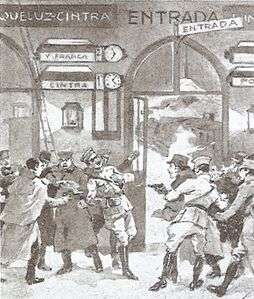José Júlio da Costa
José Júlio da Costa (14 October 1893, Garvão – 16 March 1946, Lisbon) was a Portuguese left-wing political activist who assassinated President Sidónio Pais of Portugal on 14 December 1918.[1]
José Júlio da Costa | |
|---|---|
 Assassination of Sidónio Pais | |
| Born | José Júlio da Costa 14 October 1893 Garvão, Portugal |
| Died | 16 March 1946 (aged 52) Lisbon, Portugal |
| Occupation | Staff Sergeant in the Portuguese Army (until 1916) |
| Spouse(s) | Maria do Rosário Pereira Costa |
| Parent(s) | Eduardo Brito Julius and Maria Gertrudes da Costa Julius |
| Conviction(s) | Assassination of Sidónio Pais |
| Criminal penalty | Lifetime imprisonment |
Early life
José Júlio da Costa was the second of seven children of Eduardo Brito Julius and Maria Gertrudes da Costa Julius. He grew up in a family of owners which were considered wealthy. At the time of his arrest he was married to Maria do Rosário Costa Pereira, but had no children.
Military service
On 21 May 1910 at the age of 16, José enlisted as a volunteer in the Portuguese Army. He participated in the military uprising that led to the proclamation of the Portuguese Republic on 5 October 1910. He was later placed in the Portuguese colonial army in which took part in actions in Portuguese Timor, Mozambique and Angola. When the first world war started in 1914, José tried to enlist as a volunteer to fight in World War I, but was refused.[2]
On 11 April 1916, after 6 years in service, José left the army with the rank of Staff Sergeant and returned to his homeland.
President Pais
When President Sidónio Pais was elected president in April 1918, José became angry at the government. Being a left-wing political activist, José believed that the new President ruled the country like a dictator. In a few interviews José gave before his death, he said that he was discontent with the Presidents policy and even accused Pais of betraying the ideals of the Portuguese Republican revolution of 1910 to be adapted in Germany and line up alongside the Monarchists and Clergy which were the enemies of the Republic.
José also wanted revenge on Pais because he had abandoned the Portuguese Expeditionary Corps that had fought in Flanders and France during World War I. Jose was also angry about the outcome of a failed strike by farm workers of Vale de Santiago in which he had acted as a negotiator between the authorities and the rebels, after which the agreement that he made with the authorities was repelled and the workers were severely punished with a number of strikers being deported to Portuguese Africa. After this incident, José felt betrayed by the lack of trust from the authorities. José became radicalized and vowed to avenge his countrymen and fellow soldiers by assassinating who he felt was the cause of all their problems, President or as he called him President-King Pais.
Assassination
José carefully prepared the assassination, as a letter written by himself on 12 December indicates. He waited for the President to arrive at the Rossio Station in Lisbon on 14 December 1918. The President arrived in the station but was protected by a number of bodyguards following a previous failed assassination attempt on 6 December. This however couldn't save the President, for while the president was preparing to embark on the first-floor of the station, José drew his pistol which he concealed in his Alentejo cloak and fired two shots at the President.[3]
Both shots hit the President and he fell to the ground. A panic erupted in the station but José made no attempt to escape and was apprehended moments after firing. He was arrested and brutally beaten, right on the spot. The President however was still alive and rushed to a hospital, but the second shot, which hit the President in the stomach, proved to be fatal and Pais died shortly before midnight on 14 December 1918.[4]
Aftermath
José was imprisoned and tortured by the government. José's mother and wife were arrested and were held in the dungeons of the civil government before they were finally released.
José never stood trial for his actions and was locked away in a psychiatric hospital in Lisbon where he was forgotten by the government and fell into obscurity. José died in the hospital on 16 March 1946 at the age of 52, 28 years after the assassination.
References
- "José Júlio da Costa". 25 June 2012. Retrieved 29 December 2015.
- "José Júlio da Costa". 16 January 2014. Retrieved 29 December 2015.
- "Death of Sidónio Pais". Retrieved 29 December 2015.
- "The Murder of Sidónio Pais". Waymarking.com. 11 October 2011. Retrieved 29 December 2015.